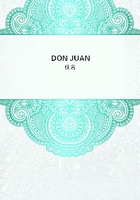
第41章
'The tenor's voice is spoilt by affectation, And for the bass, the beast can only bellow;
In fact, he had no singing education, An ignorant, noteless, timeless, tuneless fellow;
But being the prima donna's near relation, Who swore his voice was very rich and mellow, They hired him, though to hear him you 'd believe An ass was practising recitative.
''T would not become myself to dwell upon My own merits, and though young- I see, Sir- you Have got a travell'd air, which speaks you one To whom the opera is by no means new:
You 've heard of Raucocanti?- I 'm the man;
The time may come when you may hear me too;
You was not last year at the fair of Lugo, But next, when I 'm engaged to sing there- do go.
'Our baritone I almost had forgot, A pretty lad, but bursting with conceit;
With graceful action, science not a jot, A voice of no great compass, and not sweet, He always is complaining of his lot, Forsooth, scarce fit for ballads in the street;
In lovers' parts his passion more to breathe, Having no heart to show, he shows his teeth.'
Here Raucocanti's eloquent recital Was interrupted by the pirate crew, Who came at stated moments to invite all The captives back to their sad berths; each threw A rueful glance upon the waves (which bright all From the blue skies derived a double blue, Dancing all free and happy in the sun), And then went down the hatchway one by one.
They heard next day- that in the Dardanelles, Waiting for his Sublimity's firman, The most imperative of sovereign spells, Which every body does without who can, More to secure them in their naval cells, Lady to lady, well as man to man, Were to be chain'd and lotted out per couple, For the slave market of Constantinople.
It seems when this allotment was made out, There chanced to be an odd male, and odd female, Who (after some discussion and some doubt, If the soprano might be deem'd to be male, They placed him o'er the women as a scout)
Were link'd together, and it happen'd the male Was Juan,- who, an awkward thing at his age, Pair'd off with a Bacchante blooming visage.
With Raucocanti lucklessly was chain'd The tenor; these two hated with a hate Found only on the stage, and each more pain'd With this his tuneful neighbour than his fate;
Sad strife arose, for they were so cross-grain'd, Instead of bearing up without debate, That each pull'd different ways with many an oath, 'Arcades ambo,' id est- blackguards both.
Juan's companion was a Romagnole, But bred within the March of old Ancona, With eyes that look'd into the very soul (And other chief points of a 'bella donna'), Bright- and as black and burning as a coal;
And through her dear brunette complexion shone Great wish to please- a most attractive dower, Especially when added to the power.
But all that power was wasted upon him, For sorrow o'er each sense held stern command;
Her eye might flash on his, but found it dim;
And though thus chain'd, as natural her hand Touch'd his, nor that- nor any handsome limb (And she had some not easy to withstand)
Could stir his pulse, or make his faith feel brittle;
Perhaps his recent wounds might help a little.
No matter; we should ne'er too much enquire, But facts are facts: no knight could be more true, And firmer faith no ladye-love desire;
We will omit the proofs, save one or two:
'T is said no one in hand 'can hold a fire By thought of frosty Caucasus;' but few, I really think; yet Juan's then ordeal Was more triumphant, and not much less real.
Here I might enter on a chaste description, Having withstood temptation in my youth, But hear that several people take exception At the first two books having too much truth;
Therefore I 'll make Don Juan leave the ship soon, Because the publisher declares, in sooth, Through needles' eyes it easier for the camel is To pass, than those two cantos into families.
'T is all the same to me; I 'm fond of yielding, And therefore leave them to the purer page Of Smollett, Prior, Ariosto, Fielding, Who say strange things for so correct an age;
I once had great alacrity in wielding My pen, and liked poetic war to wage, And recollect the time when all this cant Would have provoked remarks which now it shan't.
As boys love rows, my boyhood liked a squabble;
But at this hour I wish to part in peace, Leaving such to the literary rabble:
Whether my verse's fame be doom'd to cease While the right hand which wrote it still is able, Or of some centuries to take a lease, The grass upon my grave will grow as long, And sigh to midnight winds, but not to song.
Of poets who come down to us through distance Of time and tongues, the foster-babes of Fame, Life seems the smallest portion of existence;
Where twenty ages gather o'er a name, 'T is as a snowball which derives assistance From every flake, and yet rolls on the same, Even till an iceberg it may chance to grow;
But, after all, 't is nothing but cold snow.
And so great names are nothing more than nominal, And love of glory 's but an airy lust, Too often in its fury overcoming all Who would as 't were identify their dust From out the wide destruction, which, entombing all, Leaves nothing till 'the coming of the just'-Save change: I 've stood upon Achilles' tomb, And heard Troy doubted; time will doubt of Rome.
The very generations of the dead Are swept away, and tomb inherits tomb, Until the memory of an age is fled, And, buried, sinks beneath its offspring's doom: